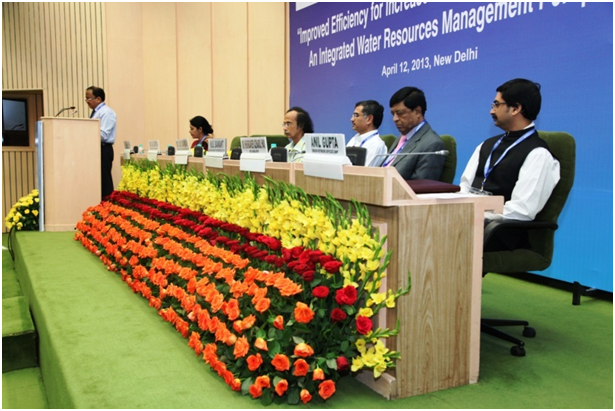This was the second time that India Water Week (IWW) was successfully organised by the Ministry of Water Resources, Government of India. It was inaugurated by the President of India, and held from 8th to 12th April, 2013 at Vigyan Bhavan, New Delhi under the main theme of “Efficient Water Management : Challenges and Opportunities”. More than 1400 international and national delegates participated in this event. GWP-India played an important role in helping to facilitate the IWW 2013.
IWW 2013 also featured a concurrently running exhibition along with the conferences, and GWP-South Asia and GWP-India hosted an exhibition stall which was displayed at the space provided by GWP-India Secretariat, WAPCOS Ltd.
A seminar on “Different Capacities, Different Roles – Empowering South Asian Women for Climate Change Adaptation” was also jointly organized as part of IWW, on 11th April 2013, by GWP-South Asia, GWP-India and WAPCOS Ltd. The keynote address was delivered by Dr. R K Gupta, President, IWP and Chairman-cum-Managing Director, WAPCOS Ltd. The inaugural address was given by Mr. Harish Rawat, Honourable Minister of Water Resources, Government of India who pointed out that the highlighting of this subject at India Water Week, clearly indicated the global recognition of women, who, as highlighted in the Dublin Rio principles play a central role in provision, management and safeguarding water resources. The seminar discussed how South Asian women can organize themselves to build resilience, adapt to climate change and what the critical role they will play in future for climate change adaptation and mitigation with respect to water security.
The Regional Day organised by GWP South Asia, GWP-India and WAPCOS Ltd was held on 12th April under the theme of “Improved Efficiency for Increased Resilience to Climate Change: an Integrated Water Resources Management Perspective”. Dr. S K Sarkar, Secretary, Ministry of Water Resources, Govt. of India was the Chief Guest at this event, while Dr. Gupta President, IWP and Chairman-cum-Managing Director, WAPCOS Ltd delivered the welcome address.
There is clear indication that in the emerging global and regional scenario, climate change adaptation and disaster coping is interwoven and crucial to the success of initiatives in the water sector, impacting on all countries in the South Asian region as an identified global hot spot. Therefore, the regional day emphasized the need to act now and to refocus and reevaluate our water management systems to adapt to a changing climate.
The regional day featured two sessions and panel discussions; the first session was on the topic of “Overview: Linking Water Use Efficiency to Climate Change Adaptation through Integrated Water Resources Management”. The key message in this session was that, improving the way we use and manage water today will make it easier to address the challenges of tomorrow. Amongst the many tools available to us, increasing the efficiency of water use stands out as key win-win solution. The underlying principles in increasing water use efficiency are recognizing land, water, energy and climate change inter-linkages, reducing consumptive use, reusing where feasible, recycling wastewater and adopting a risk based approach.
The second session was on the theme of “Water Cooperation: Across sectors and borders for the efficient and sustainable use of water”. South Asia’s water woes could be significantly mitigated through improved water governance of its major trans boundary rivers: the Indus, Ganges, and Brahmaputra, which straddle international boundaries and support the lives millions of people. Effective regional cooperation in managing these and other transboundary rivers in the region can only be achieved when countries work together. Negotiations on transboundary water are state-controlled, single-track processes that have failed to understand the diversity of claims on water and the potential for benefit sharing of transboundary rivers. This has kept broadly agreeable solutions on transboundary water from emerging. Open access to information and data sharing is the most fundamental approach that can lead to multi-track dialogue process that can actually change the agenda of negotiation and help to make it broader in terms of the potential for benefit sharing. GWP’s role as a neutral platform is important in helping negotiate partisan interests and move cooperation forward at critical junctures.
